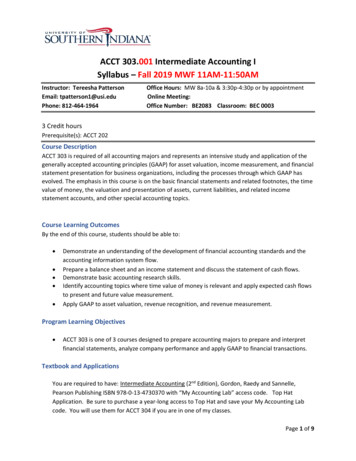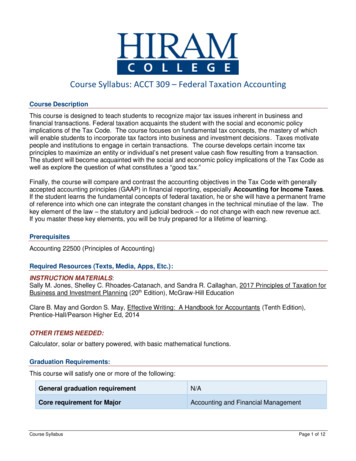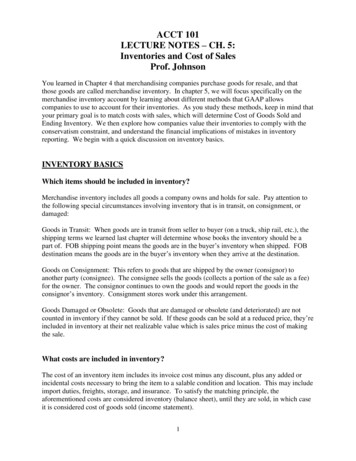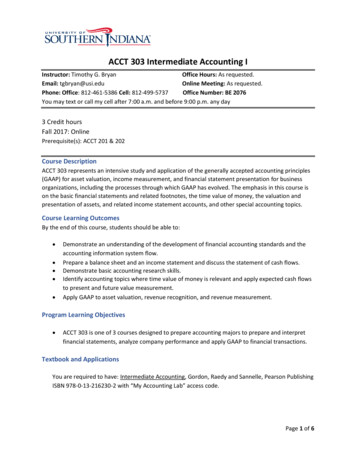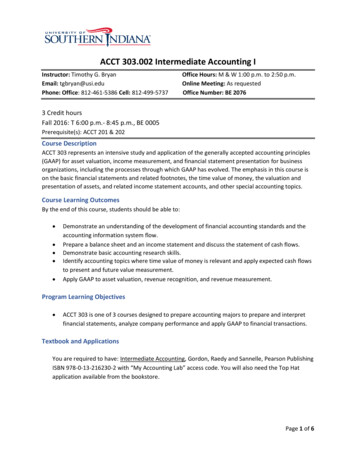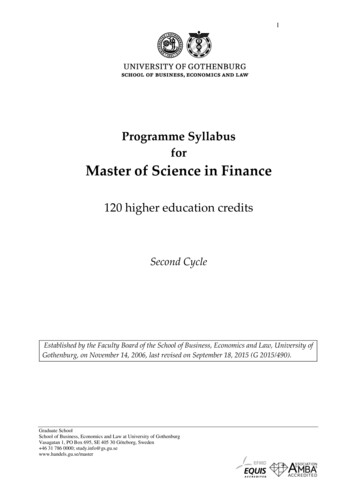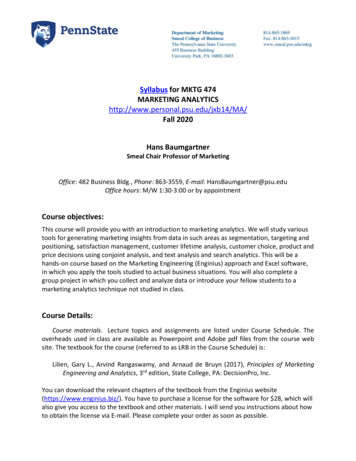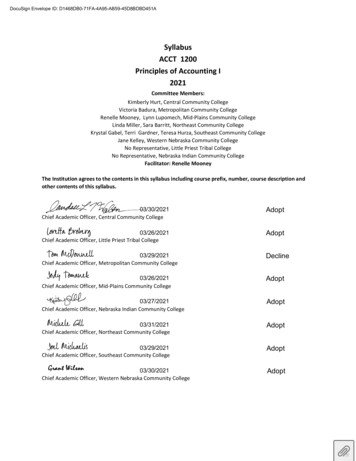
Transcription
DocuSign Envelope ID: D1468DB0-71FA-4A95-AB59-45D8BDBD451ASyllabusACCT 1200Principles of Accounting I2021Committee Members:Kimberly Hurt, Central Community CollegeVictoria Badura, Metropolitan Community CollegeRenelle Mooney, Lynn Lupomech, Mid‐Plains Community CollegeLinda Miller, Sara Barritt, Northeast Community CollegeKrystal Gabel, Terri Gardner, Teresa Hurza, Southeast Community CollegeJane Kelley, Western Nebraska Community CollegeNo Representative, Little Priest Tribal CollegeNo Representative, Nebraska Indian Community CollegeFacilitator: Renelle MooneyThe Institution agrees to the contents in this syllabus including course prefix, number, course description andother contents of this syllabus.03/30/2021Chief Academic Officer, Central Community CollegeAdopt03/26/2021Chief Academic Officer, Little Priest Tribal CollegeAdopt03/29/2021Chief Academic Officer, Metropolitan Community CollegeDecline03/26/2021Chief Academic Officer, Mid‐Plains Community CollegeAdopt03/27/2021Chief Academic Officer, Nebraska Indian Community CollegeAdopt03/31/2021Chief Academic Officer, Northeast Community CollegeAdopt03/29/2021Chief Academic Officer, Southeast Community CollegeAdopt03/30/2021Chief Academic Officer, Western Nebraska Community CollegeAdopt
DocuSign Envelope ID: D1468DB0-71FA-4A95-AB59-45D8BDBD451AI.CATALOG DESCRIPTIONACCT1200Principles of Accounting IPrerequisite: NoneThis course is designed to provide introductory knowledge of financial accountingprinciples, concepts, and practices. Included topics are the balance sheet, the incomestatement, the statement of equity, the statement of cash flows, journals, ledgers,accruals, adjusting and closing entries, internal controls, inventories, fixed andintangible assets, liabilities, equity, and financial statement analysis. This courseprovides a foundation for more advanced work in the fields of accounting andbusiness.3.0 semester credit hours/4.5 quarter credit hours/45 contact hoursII.COURSE OBJECTIVES/COMPETENCIESCourse will:1.2.3.4.5.6.7.III.Demonstrate the role of accounting in business.Introduce basic financial accounting terms, concepts, and principles.Illustrate a series of transactions through the accounting cycle.Model the recording and reporting of transactions for service andmerchandising businesses.Model the recording and reporting of transactions for a corporation.Illustrate the preparation and analysis of financial statements.Discuss ethics in accounting.STUDENT LEARNING OUTCOMESStudents will be able to:1.Demonstrate an understanding of accounting and business.2.Prepare journal entries.3.Prepare a trial balance, adjusting entries, and financial statements.4.Complete the closing process in the accounting cycle.5.Account for receivables.Nebraska Transfer InitiativeACCT1200 – Principles of Accounting IUpdated: 2021Page 1 of 5
DocuSign Envelope ID: D1468DB0-71FA-4A95-AB59-45D8BDBD451AIV.6.Analyze and record inventory transactions.7.Utilize generally accepted accounting principles to account for investments intangible and intangible operating assets, long-term debt, and equity financingarrangements.8.Develop, analyze, and interpret financial statements for businesses.9.Define ethics and explain why they are important to accounting.CONTENT/TOPICAL OUTLINEA.B.C.D.Introduction to Accounting and Business1.The nature of a business2.The role of accounting in business3.Business ethics and ethical conduct4.The profession of accounting5.Accounting principles and practice6.GAAP and IFRS7.The accounting equation and elements of the equation8.Business transactions9.Financial statementsAnalyzing and Recording Transactions1.Characteristics of an account2.Chart of accounts3.Normal balances of accounts4.Rules of debit and credit5.Analyzing and recording transactions6.Preparing a trial balance8.The usefulness and limitations of a trial balance8.Discovering and correcting errors in recording transactionsAccrual Accounting and the Adjusting Process1.Cash vs. Accrual Accounting2.The adjusting process and adjusting entries3.The fiscal year and the natural business yearCompleting the Accounting Cycle1.Preparing financial statements2.The closing process and closing entriesNebraska Transfer InitiativeACCT1200 – Principles of Accounting IUpdated: 2021Page 2 of 5
DocuSign Envelope ID: Post-closing trial balanceAccounting for Inventory1.Perpetual vs. periodic inventory systems2.Inventory transactions.3.Financial statements for a merchandising business4.Adjusting and closing entries for a merchandising business5.Internal control of inventories6.The effect of inventory errors on the financial statements7.Inventory cost flow assumptions8.Alternate inventory valuation methodsCash1.Cash and cash equivalents2.Internal control of cash3.Bank reconciliation4.Petty CashReceivables1.Classifications of receivables2.Internal control of receivables3.Accounting for uncollectible accounts4.Accounting for notes receivableFixed Assets and Intangible Assets1.Characteristics of fixed assets2.Accounting for depreciation3.Capital expenditures vs. revenue expenditures4.Disposal of fixed assets5.Internal controls of fixed assets6.Natural resources and depletion7.Intangible assets and amortizationLiabilities1.Characteristics of liabilities2.Short-term notes payable and other current liabilities3.Contingent liabilities4.Bonds payable and other long-term liabilitiesStockholder’s Equity1.Characteristics of a corporation2.Sources of paid-in capitalNebraska Transfer InitiativeACCT1200 – Principles of Accounting IUpdated: 2021Page 3 of 5
DocuSign Envelope ID: D1468DB0-71FA-4A95-AB59-45D8BDBD451A3.Issuing stock4.Other topics in corporate accountingK.Statement of Cash Flows1.Purpose of statement of cash flows2.Recognizing cash inflows and outflows3.Indirect vs. directL. Financial Statement Analysis1.Basic ratios and analysisV.INSTRUCTIONAL MATERIALS1.Textbook (The following textbooks are recommended.)Warren, Reeve, and Duchac, Accounting. (Cengage)Warren, Reeve, and Duchac, Financial and Managerial Accounting (Cengage)Wild, Shaw, and Chiappetta, Financial Accounting Fundamentals. (McGrawHill)Wild, Shaw, and Chiappetta, Financial and Managerial Accounting. (McGrawHill)Nobles, Mattison, Matsumura, Horngren’s Accounting. (Pearson)Weygandt, Kimmel, Kieso, Financial Accounting (Wiley)2.VI.Supplementary materials:a.Instructor will utilize working papers and/or online homeworkmanagement systems.METHODS OF PRESENTATIONA.Methods of presentation and delivery format are determined by the instructor.They traditionally include some combination of the following:1.Lecture2.Class discussion3.Presentation and discussion of solutions to problems and exercises4.Web deliveryNebraska Transfer InitiativeACCT1200 – Principles of Accounting IUpdated: 2021Page 4 of 5
DocuSign Envelope ID: DS OF EVALUATIONA.Methods of evaluation are determined by the instructor. Evaluation traditionallyincludes some combination of the following.1.Unit tests2.Comprehensive final exam3.Quizzes, assignments, and projectsB.Students will receive a course outline/syllabus indicating the instructor’sspecific attendance policy, course requirements, and grading criteria.INSTITUTIONAL DEFINED SECTION(To be used at the discretion of each community college as deemed necessary.)Nebraska Transfer InitiativeACCT1200 – Principles of Accounting IUpdated: 2021Page 5 of 5
C. Accrual Accounting and the Adjusting Process 1. Cash vs. Accrual Accounting 2. The adjusting process and adjusting entries 3. The fiscal year and the natural business year D. Completing the Accounting Cycle 1. Preparing financial statements 2. The closing process and closing entries D
